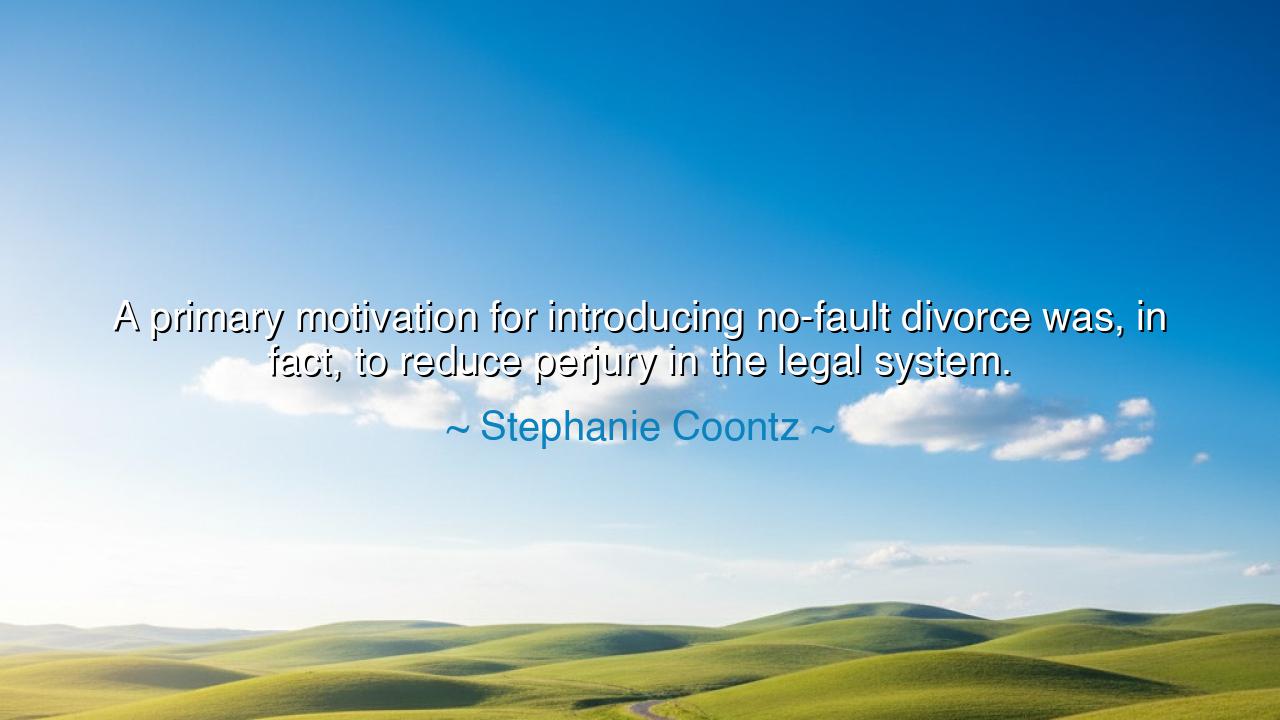
A primary motivation for introducing no-fault divorce was, in
A primary motivation for introducing no-fault divorce was, in fact, to reduce perjury in the legal system.






The sage Stephanie Coontz reveals a truth hidden beneath the stones of history when she proclaims: “A primary motivation for introducing no-fault divorce was, in fact, to reduce perjury in the legal system.” These words strike like a bell in the temple, reminding us that even the sacred halls of justice can be corrupted when human hearts are bound by laws too rigid for their living struggles. In the days before no-fault divorce, when one could only be freed from marriage by proving adultery, cruelty, or abandonment, countless men and women, yearning for release, turned to falsehood. Courts became theaters where lovers invented sins, friends played false witnesses, and truth itself was sacrificed upon the altar of escape.
Thus was born the age of perjury, not from wickedness alone, but from desperation. A husband might accuse a wife of betraying him with another man, though she had done no such thing. A wife might swear that her husband struck her, though his hands had never raised in violence. Lawyers, judges, and even entire communities came to accept this ritual of falsehood, for all knew that the bonds of law were harsher than the reality of human frailty. The law demanded fault, and where none could be proven, it was manufactured. In such a world, the law itself became a lie.
It was this corruption that the reformers of the twentieth century sought to end. In the United States, as in many nations, the rise of no-fault divorce was not born from a desire to belittle marriage, but to cleanse the courts of dishonesty. When California, under Governor Ronald Reagan in 1969, became the first state to adopt such a law, it marked a turning point. No longer would men and women have to dishonor themselves or each other with fabricated accusations. They could simply declare that the marriage had broken down, that its spirit had departed, and dissolve the bond without dragging truth through the mire.
Consider the tale of a woman in New York in the early 1960s, before such laws were passed. Trapped in a marriage that had long since grown cold, she longed for release. Yet the law demanded proof of adultery. Her husband, unwilling to play along, would not confess. Desperate, she staged a scene: she hired a man to pose as her lover and arranged for witnesses to "catch" them together. The case went to court, the act was declared, and though she gained her freedom, she carried forever the bitter taste of deceit. This story, though but one among thousands, shows why Coontz speaks truth: it was not love that the law preserved, but hypocrisy.
The wisdom here is clear: when laws force men and women to choose between their honor and their liberty, corruption grows like weeds in the cracks of stone. Better to craft laws that reflect the realities of human weakness than to demand impossible perfection and thus multiply sin. The architects of no-fault divorce sought not to celebrate broken vows, but to end the greater evil—the making of liars out of the honest, and the twisting of justice into a charade.
Yet, children of tomorrow, do not mistake this lesson as license for careless love. The easing of law does not absolve us of the duty to cherish, nurture, and fight for the bonds we forge. Instead, let it teach us that truth must always be honored above appearances. Better a marriage ended honestly than one held together by deceit. Better an ending spoken in clarity than one written in the lies of the courtroom.
The path of wisdom, then, is twofold. First, in our unions, let us strive for openness, that we may not reach the courts at all. Second, in our dealings with law and society, let us demand structures that honor truth, not force falsehood. When love dies, let us release it with dignity rather than bind it with lies. When bonds are broken, let us remember that honesty, even in sorrow, is nobler than deceit in pursuit of freedom.
Thus, carry this teaching into your own life: treasure truth above all. If your vows still live, water them with patience, with humility, and with care. But if they perish, do not compound loss with falsehood. Stand in the light of honesty, for even in endings, honor may endure. And let the words of Coontz echo within you: it is not fault alone that destroys marriages, but the perjury that destroys souls.






AAdministratorAdministrator
Welcome, honored guests. Please leave a comment, we will respond soon